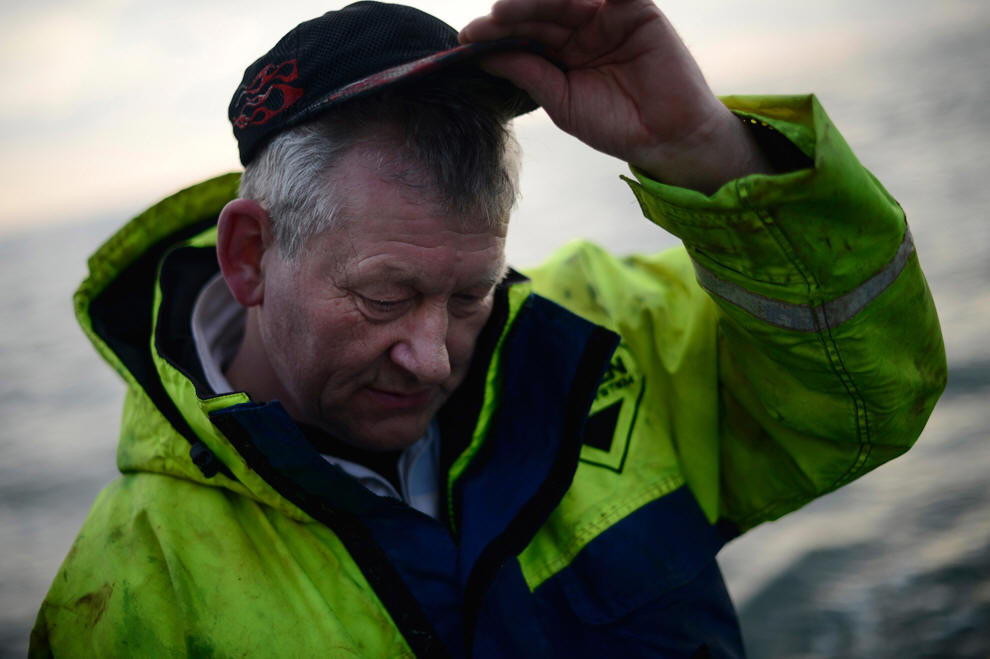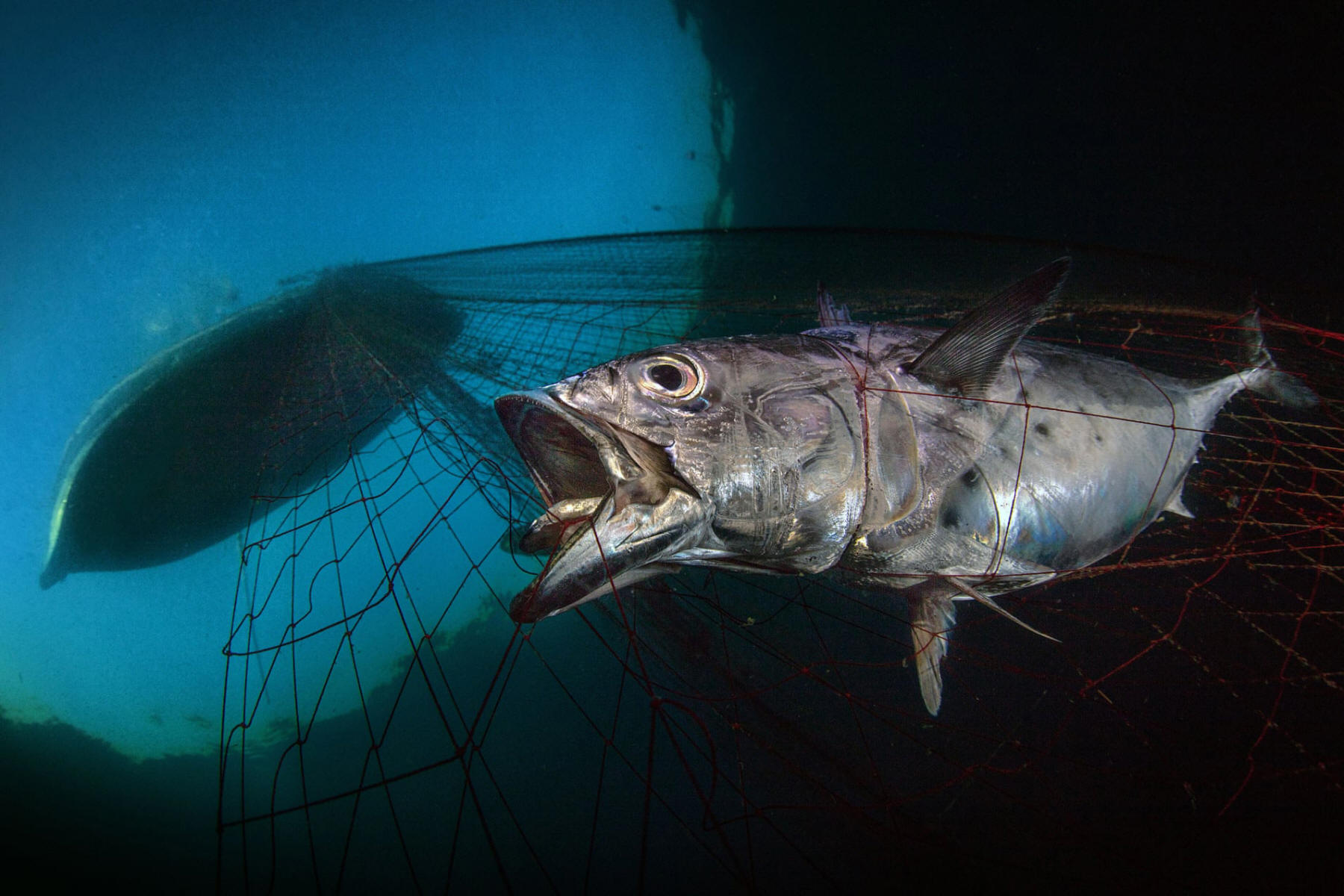|
Vocapedia >
Earth > Resources, population
Seas,
Oceans >
Fishing industry

Skipper of the Whitby Rose, Howard Locker,
aboard his trawler in the North Sea, February 28, 2013.
Global warming has expanded fish habitats northward,
with fish stocks sometimes disappearing for weeks on end.
Photograph: Dylan Martinez
Reuters
Boston Globe > Big Picture > Last of the Trawler Men
April 5, 2013
http://archive.boston.com/bigpicture/2013/04/
last_of_the_trawler_men.html - broken link

Marine conservation category winner:
Last Dawn, Last Breath by Pasquale Vassallo (Italy)
in Tyrrhenian Sea, Bacoli, Naples, Italy
As the fishermen quickly hauled on the nets,
I tried to take some shots of trapped fish still suffering in
the mesh,
such as this tuna ( Euthynnus alletteratus)
Photograph: Pasquale Vassallo
Underwater photographer of the year 2020
Underwater photographer of the year 2020 winners – in pictures
All the winning images,
all the backstories and all the judges’ comments can be found
in the The Underwater Photographer of the Year Yearbook
G
Thu 27 Feb 2020 07.00 GMT
https://www.theguardian.com/environment/gallery/2020/feb/27/
underwater-photographer-of-the-year-2020-winners-in-pictures
fish USA
https://www.npr.org/sections/thesalt/2017/08/02/
540060426/more-women-move-into-maines-rough-and-risky-world-of-lobstering
fish UK
https://www.theguardian.com/environment/2010/aug/02/
census-marine-life-sea
fish USA
https://www.npr.org/sections/thesalt/2018/04/23/
603755074/for-50-years-
deep-water-trawls-likely-caught-more-fish-than-anyone-thought
wild species > reef fish
UK
https://www.theguardian.com/environment/2022/jul/08/
overexploitation-wild-species-sustainability-un-report-aoe
fisherman, fishermen
USA
https://www.npr.org/sections/health-shots/2020/12/25/
949643418/fishermen-team-up-with-food-banks-to-help-hungry-families
https://www.npr.org/2018/12/16/
676887454/alaska-fishermen-hauling-a-bigger-catch-
with-gear-they-get-to-use-for-the-first-
https://www.npr.org/sections/thesalt/2017/08/02/
540060426/more-women-move-into-maines-rough-and-risky-world-of-lobstering
commercial fishing
UK
https://www.theguardian.com/news/audio/2021/apr/26/
the-seaspiracy-controversy-should-we-stop-eating-fish-
podcast - Guardian podcast
sustainable fishing
UK
https://www.theguardian.com/news/audio/2021/apr/26/
the-seaspiracy-controversy-should-we-stop-eating-fish-
podcast - Guardian podcast
sustainability
UK
https://www.theguardian.com/environment/2022/jul/08/
overexploitation-wild-species-sustainability-un-report-aoe
fish market
UK
https://www.theguardian.com/artanddesign/gallery/2021/jul/03/
sketches-traded-for-stories-at-billingsgate-fish-market-
in-pictures - Guardian pictures
fishmongers
UK
https://www.theguardian.com/artanddesign/gallery/2021/jul/03/
sketches-traded-for-stories-at-billingsgate-fish-market-
in-pictures - Guardian pictures
global fishing USA
https://www.npr.org/sections/thesalt/2018/02/22/
588034042/new-maps-reveal-
global-fishings-vast-scope-of-exploitation-of-the-ocean
deep-water trawls USA
https://www.npr.org/sections/thesalt/2018/04/23/
603755074/for-50-years-deep-water-trawls-likely-caught-more-fish-
than-anyone-thought
lobster boat
USA
https://www.npr.org/sections/thesalt/2017/08/02/
540060426/more-women-move-into-
maines-rough-and-risky-world-of-lobstering
trawler
UK
https://www.theguardian.com/society/2020/feb/21/
cod-wars-to-food-banks-
how-fleetwood-lancashire-fishing-town-is-hanging-on
Boston Globe >
Big Picture
Last of the Trawler Men
USA
April 5, 2013
Reuters
photographer, Dylan Martinez,
recently spent a few days
in the once-busy fishing port of Whitby.
Now just 200 people are employed in fishing;
the fleet is down to only a few boats.
Things aren't
looking good for Locker
- one of the last remaining trawler men
in the area.
A combination of crippling fishing quotas,
climate change and overfishing has all but crushed
the local fishing industry.
Global
warming has expanded fish habitats northward,
causing fish stocks to sometimes disappear
for weeks on end.
Boats return from sea with largely empty nets,
and the atmosphere, dour.
Often schools
of fish then reappear unpredictably,
resulting in bumper catches and jubilation
- then E.U. quotas take effect
and force fishermen to dump excess catch in the sea
to avoid hefty E.U. fines.
This scenario is echoed in other historic fishing areas
across the globe, including New England.
http://www.boston.com/bigpicture/2013/04/
last_of_the_trawler_men.html - broken link
net
UK
https://www.theguardian.com/environment/gallery/2020/feb/27/
underwater-photographer-of-the-year-2020-winners-in-pictures
EU common fisheries policy
marine eco-systems
fishing
UK
https://www.theguardian.com/environment/gallery/2020/feb/27/
underwater-photographer-of-the-year-2020-winners-in-pictures
https://www.theguardian.com/society/2020/feb/21/
cod-wars-to-food-banks-how-fleetwood-lancashire-fishing-town-is-hanging-on
fishing
USA
https://www.npr.org/2017/07/22/
538542282/as-log-trucks-and-fishing-boats-leave-
gold-beach-tries-to-remake-its-identity
fishing industry
UK
https://www.theguardian.com/artanddesign/gallery/2024/may/09/
hull-life-during-the-death-of-the-fishing-industry-alec-gill-
in-pictures - Gurdian picture gallery
fishing industry
USA
https://www.nytimes.com/2024/08/31/
business/economy/alaska-fishing-economy.html
https://www.propublica.org/article/
fishing-new-bedford-private-equity - July 6, 2022
https://www.npr.org/2019/01/04/
682061603/government-shutdown-
may-hamper-alaskas-lucrative-fishing-industry
overfishing UK
https://www.theguardian.com/environment/2022/oct/26/
north-east-atlantic-overfishing-brexit
https://www.theguardian.com/environment/2013/jan/22/
mackerel-off-conservationists-eat-list
overexploit the planet
UK
https://www.theguardian.com/commentisfree/2022/jul/08/
climate-crisis-biodiversity-decline-overexploited-planet-change-to-survive-aoe
overexploitation
UK
https://www.theguardian.com/environment/2022/jul/08/
overexploitation-wild-species-sustainability-un-report-aoe
fish
stocks USA
http://www.nytimes.com/2015/01/02/
opinion/where-have-all-the-cod-gone.html
cod stocks
UK
http://www.theguardian.com/environment/2015/apr/08/
north-sea-cod-stocks-bounce-back-analysis-shows
depleted stocks
USA
http://www.npr.org/blogs/thetwo-way/2015/04/16/
400177895/feds-place-commercial-sardine-fishing-
on-hold-for-more-than-a-year
extinction
sustainable fishing
cod
UK / USA
https://www.theguardian.com/society/2020/feb/21/
cod-wars-to-food-banks-how-fleetwood-lancashire-fishing-town-is-hanging-on
http://www.npr.org/2015/10/30/
452849153/a-perfect-soldier-remembering-a-warrior-in-the-battle-against-homophobia
http://www.nytimes.com/2015/01/02/
opinion/where-have-all-the-cod-gone.html
a
total ban on cod fishing
sardine
USA
http://www.npr.org/blogs/thetwo-way/2015/04/16/
400177895/feds-place-commercial-sardine-fishing-on-hold-for-more-than-a-year
sardine harvest
USA
http://www.npr.org/blogs/thetwo-way/2015/04/16/
400177895/feds-place-commercial-sardine-fishing-on-hold-for-more-than-a-year
commercial sardine fishing season
USA
http://www.npr.org/blogs/thetwo-way/2015/04/16/
400177895/feds-place-commercial-sardine-fishing-on-hold-for-more-than-a-year
seafood
farmed seafood
sea bird
cockler
salmon > hatchery
USA
https://www.propublica.org/article/
salmon-hatcheries-govern - Mat 24, 2022
oyster
USA
https://www.npr.org/2019/11/28/
783272904/fisheries-and-fishermen-hard-hit-
by-decline-of-oysters-on-gulf-coast
oyster farming
USA
https://www.npr.org/2019/11/28/
783272904/fisheries-and-fishermen-hard-hit-
by-decline-of-oysters-on-gulf-coast
oyster farmer
USA
https://www.npr.org/2019/11/28/
783272904/fisheries-and-fishermen-hard-hit-
by-decline-of-oysters-on-gulf-coast
oyster man
USA
https://www.npr.org/2019/11/28/
783272904/fisheries-and-fishermen-hard-hit-
by-decline-of-oysters-on-gulf-coast
fisheries
USA
https://www.npr.org/2019/11/28/
783272904/fisheries-and-fishermen-hard-hit-
by-decline-of-oysters-on-gulf-coast
crop
USA
https://www.npr.org/2019/11/28/
783272904/fisheries-and-fishermen-hard-hit-
by-decline-of-oysters-on-gulf-coast
oyster reefs
USA
https://www.npr.org/2018/12/18/
676914667/gulf-oyster-reefs-are-hurting-
now-theres-help-from-oil-spill-aid-money
Britain's abandoned whale hunting stations
-
in pictures UK 10 June 2014
Between 1909 and 1965,
the whaling station of Leith Harbour on South
Georgia
was one of the busiest whaling stations in the
world,
with more than 48,000 whales processed into oil for margarine,
bone meal for fertiliser and
other products.
Last November,
a film crew was granted access
to the abandoned whaling stations,
and a new BBC4 documentary shows the remains of
whaling life,
and the wildlife
that is re-colonising Leith
Harbour.
https://www.theguardian.com/environment/gallery/2014/jun/10/
britains-whale-hunters-in-pictures - Guardian picture gallery
Corpus of news articles
Earth > Water
> Sea, Ocean >
Fishing
industry, Fishermen
Where Have All the Cod Gone?
JAN. 1, 2015
The New York Times
The Opinion Pages
Op-Ed Contributor
By W. JEFFREY BOLSTER
PORTSMOUTH, N.H. — IN November, regulators from the National
Oceanic and Atmospheric Administration shut down recreational and commercial cod
fishing in the Gulf of Maine, that enchanting arm of the coastal sea stretching
east-northeast from Cape Cod. They did not have much choice: Federal law
requires action to rebuild fish stocks when they are depleted, and recent
surveys revealed cod populations to be at record lows, despite decades of
regulations intended to restore them.
It’s easy to imagine this recent drop in the cod population as a new phenomenon
— a result, perhaps, of global warming, or some combination of climate change
and overfishing by giant steel ships armed with electronic fish-finders and
precise GPS navigation systems. And it’s just as easy to imagine that, after a
season or two of belt-tightening, fish populations will rebound — it is, after
all, a strategy that state and federal regulators have pursued for decades.
In fact, humans have been affecting the Atlantic’s fish stocks for centuries,
beginning with technology so simple that people today would not even consider it
“technology.” Forgetting that history, we opt for short-term fixes, which only
compound the problem.
The fishery resources of the western Atlantic once seemed virtually limitless,
with fish supposedly as numerous as grains of sand in the Sahara. And yet the
current emergency effort to restore cod populations is simply the latest chapter
in a 150-year saga in which fishermen, scientists, industrialists and
politicians have consistently confronted emptier nets and fewer fish.
As early as the 1850s, fishermen from Maine and Massachusetts began to pester
their governments to do something about declining cod catches. Those men fished
with hooks and lines from small wooden sailboats and rowboats. Fearing “the
material injury of the codfishing interests of this state” by increased fishing
for menhaden, a critical forage fish for cod, fishermen from Gouldsboro, Me.,
implored the Legislature in 1857 to limit menhaden hauls.
Yet annual cod landings in the Gulf of Maine continued to slide, from about
70,000 metric tons in 1861 to about 54,000 metric tons in 1880, to about 20,000
tons in the 1920s, to just a few thousand metric tons in recent years. There
have been a few upticks along the way, such as one bumper year in the mid-1980s
when the cod catch reached 25,000 tons (due, in part, to an unnecessarily large
expansion of the fishing fleet), but for the most part the trend has been
noticeably downward since the era of the Civil War. There have been plenty of
warnings along the way. Maine’s fishery commissioner, Edwin W. Gould, spoke out
plainly in 1892. “It is the same old story,” he said. “The buffalo is gone; the
whale is disappearing; the seal fishery is threatened with destruction.” For Mr.
Gould, the path forward was clear: “Fish need protection.”
In July 1914, after more than 40 years of reports on declining fishery resources
by the United States Fish Commission and state fish commissions, The New York
Times ran an article forecasting disaster. “Extermination Threatens American Sea
Fishes — Cost to Consumer Has Risen between 10 and 600 Per Cent Because of
Decrease in Supply.”
But that was right before a technological revolution in the fisheries. Sails and
oars and hooks and lines were about to be replaced by steam and diesel engines,
and massive nets dragged along the bottom that snared every fish in their path.
Decades of well-founded concerns about depletion were overwhelmed by an
avalanche of cheap fish. The new generation of draggers could fish faster,
harder and deeper for the few fish that remained. Fishermen breathed a sigh of
relief.
Twentieth-century cod populations, ravaged by draggers’ efficiency, declined
further. In 1954 a fisheries economist from Boston charged fishing interests
with continuing “to exploit recklessly the limited self-renewing stocks of these
species.” That was just before the first factory-equipped freezer-trawler
arrived at the prime fishing waters around the Grand Banks off Newfoundland from
Europe. The size of an ocean liner, it could scoop up everything in its wake.
Those ships made the steam-powered draggers from 1914 look positively quaint.
And they caught lots of fish.
Overfishing has been the norm for a very long time, but the market has masked
the mess in two fundamental ways. At every step fishermen confronting declining
catches developed gear that fished more intensively, taking a larger percentage
of the fewer fish that remained. Such a strategy was clearly not sustainable.
Meanwhile, fishermen continued to earn enough to make fishing worthwhile, even
if many encouraged their sons to pursue other careers because there would be
little future in fishing. The Gulf of Maine cod stocks today are probably only a
fraction of 1 percent of what they were during George Washington’s presidency.
If there is any lesson in this story of large-scale, long-term environmental
degradation, it is not that fishermen were (or are) to blame, or that scientists
were (or are) to blame, or that politicians were (or are) to blame. The system
was (and is) to blame. Our system of exploiting nature’s resources, with its
checks and balances, its desire for prosperity and security, its willingness to
honor a multiplicity of voices, and its changing sense of “normal” is
insufficiently nimble to stop the desecration of commonly held resources on
which the long-term good of everyone depends.
The recent ban on cod fishing in the Gulf of Maine was an important step toward
restoration, though clearly marine systems are very complex and subject to many
variables. Considering that ban in light of history, however, is crucial.
Historical perspectives provide a vital sense of scale for the sobering
restoration challenges we face.
The fisheries story, however, also provides a heading into the future, revealing
as it does the tragic consequences of decision makers’ unwillingness to steer a
precautionary course in the face of environmental uncertainties. At every step
of the way, decisions could have been made to exploit fish stocks more
sustainably. That’s a tale worth pondering.
Correction: January 2, 2015
An earlier version of this article misstated the name of the agency that shut
down cod fishing in the Gulf of Maine. It is the National Oceanic and
Atmospheric Administration, not National Oceanographic and Atmospheric
Administration.
W. Jeffrey Bolster is a professor of history at the University of
New Hampshire and the author of “The Mortal Sea: Fishing the Atlantic in the Age
of Sail.”
A version of this op-ed appears in print on January 2, 2015, on page A21 of the
New York edition with the headline: Where Have All the Cod Gone?.
Where Have All the Cod Gone?,
NYT,
1.1.2015,
https://www.nytimes.com/2015/01/02/
opinion/where-have-all-the-cod-gone.html
Explore more on these topics
Anglonautes > Vocapedia
water, oceans, seas, rivers >
marine life
Earth > geography,
animals, wildlife,
endangered and extinct species,
resources,
agriculture / farming, gardening,
population, waste, pollution,
global warming, climate change,
weather, extreme weather, disasters,
climate action, activists
industry, energy, commodities
|